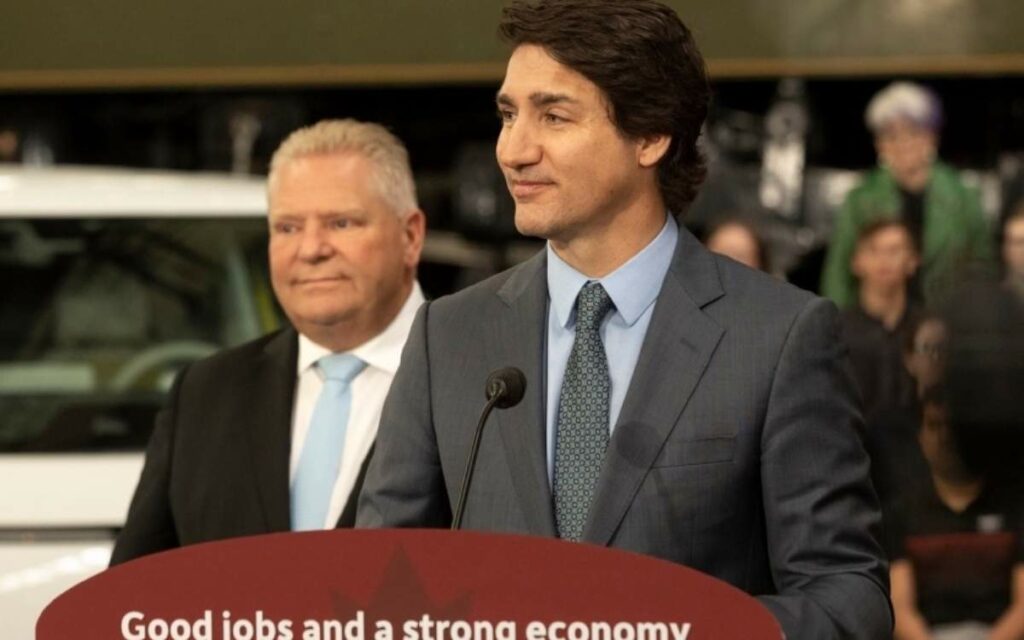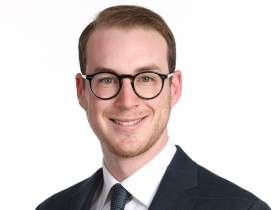
Trudeau’s 2024 tax hikes, including increased payroll taxes and higher CPP contributions, will cost the average $80,000 earner an extra $507 annually. Meanwhile, Ontario’s promised income tax cut by Premier Doug Ford remains undelivered, leaving taxpayers grappling with increased financial strain amid rising expenses. Photo credit: The Canadian Press/Tara Walton
Prime Minister Justin Trudeau is set to pummel taxpayers with a raft of tax hikes in 2024. And Ontario Premier Doug Ford isn’t living up to his promise to deliver substantial tax relief.
There are three key federal policy changes that will start to empty taxpayers’ wallets as soon as the clock strikes midnight on New Year’s Eve: increases in payroll taxes, Canada Pension Plan contributions and employment insurance premiums.
Payroll taxes are set to cost workers up to an additional $347 next year alone.
Contributions toward the Canada Pension Plan will rise by $113 in 2024.
And employment insurance costs will jump by $47 for workers and $65 for employers.
How much of a blow will this be for the typical taxpayer?
A taxpayer earning $80,000 next year will see an extra $507 taken off their paycheques compared to what that very same taxpayer had to pay to the taxman in 2023.
The next raft of federal tax increases take effect on April Fool’s Day. But this year, the only ones laughing will be bureaucrats in Ottawa.
On April 1, the carbon tax will be increased yet again. The cost will rise from $65 per tonne to $80 per tonne. That translates into a tax increase at the gas pump of about 3.3 cents per litre.
Then there’s alcohol. The feds are even making it more expensive to grab a pint with friends and try to forget about all the other tax hikes.
Alcohol taxes will go up by 4.7 per cent.
The Trudeau government is increasing costs for Canadians at a time when taxpayers are barely making ends meet. Half of Canadians say they are $200 away from not being able to pay their bills. But Trudeau’s payroll tax hike alone will cost as much as $347.
If taxpayers are hoping for someone to rescue them from the doom and gloom of Trudeau’s tax hikes, they shouldn’t expect Ford to be their knight in shining armour.
Ford’s signature promise when running for office was a major middle-class income tax cut. His original promise was to cut the second income tax bracket by 20 per cent, saving taxpayers up to $786 a year.
Five years later, there’s been no sign of a provincial income tax cut.
Ontario families are struggling. A major income tax cut from Queen’s Park would allow Ontarians to take home bigger paycheques and help families make ends meet. And it would help to offset all of the reckless tax hikes coming out of Ottawa.
Why are Ontario taxpayers still waiting for an income tax cut five years after Ford promised it?
Because the Ford government has shown no restraint when it comes to government spending.
Despite railing against former premier Kathleen Wynne’s reckless spending habits, Ford has failed to stop the flow of reckless spending out of Queen’s Park.
If Ford had simply increased government spending to keep pace with inflation since coming to power, Ontario would be spending $10 billion less this year than planned. That would free up billions to balance the books and deliver income tax relief.
The sad reality is that Ontario taxpayers haven’t gotten their income tax cut because the Ford government can’t stop spending money the province doesn’t have.
As of today, neither Ottawa nor Queen’s Park is planning to cut taxes to make life more affordable.
That needs to change.
Both Trudeau and Ford should hunker down and cut government spending to make room for tax relief.
They could start by kicking their corporate welfare addiction and ending the wage premium for government employees.
Those two moves alone would save billions and allow Trudeau to cancel his tax hikes and give Ford the room to finally deliver on income tax relief.
It’s time for politicians to make a resolution for 2024: government, not taxpayers, must learn to do more with less.

Jay Goldberg is the Ontario Director at the Canadian Taxpayers Federation. He previously served as a policy fellow at the Munk School of Public Policy and Global Affairs. Jay holds a Ph.D. in Political Science from the University of Toronto.






